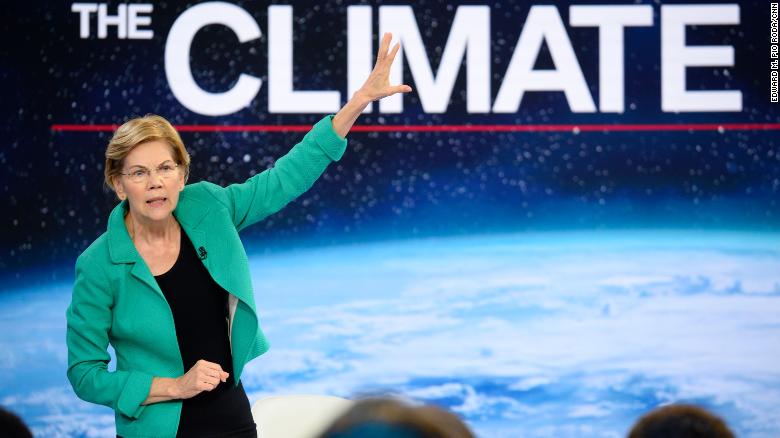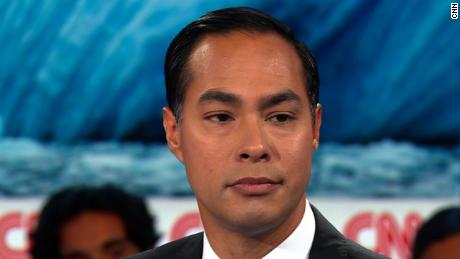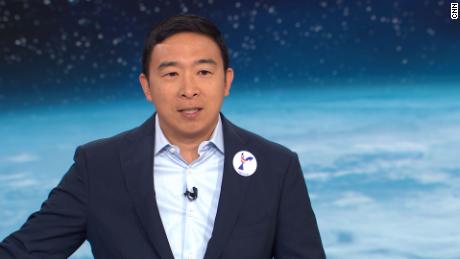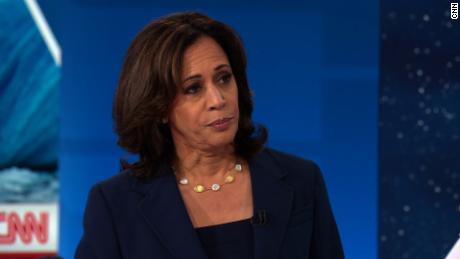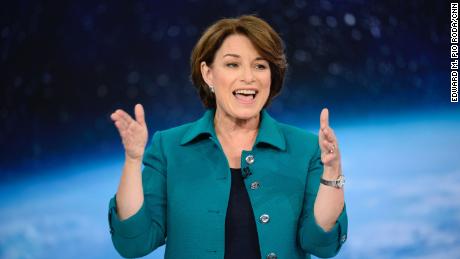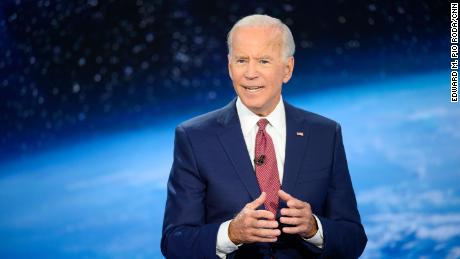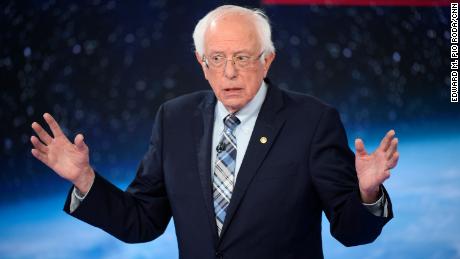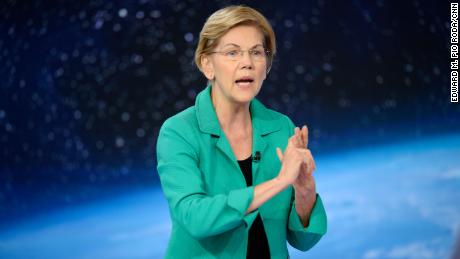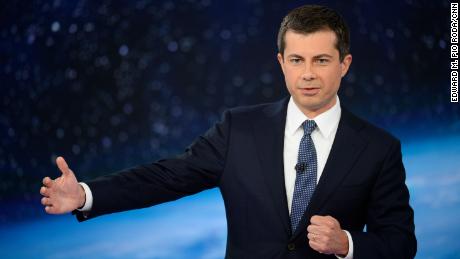(CNN)CNN's marathon town hall Wednesday night put the climate crisis closer to the center of a presidential election than ever before.
Ten Democratic candidates took to the stage as Hurricane Dorian menaced the East Coast and at a time when the impact of a warming Earth is no longer just a vision of a catastrophic future but is increasingly visible.
At times, candidates waged a bidding war to show liberal activists their plan was the most audacious -- and even expensive. But with an eye on November 2020, others warned against throwing the economy out of the window.
The contenders, who all embrace the science of climate change, offered voters an alternative to a President who views climate change as a "hoax" and slams their "dreams and windmills."
But Donald Trump's mocking tweets and GOP rapid response attacks during the event reflected the risks Democrats run: While going big on climate is the price of entry in their presidential race, it's yet to be proven as a shrewd general election strategy.
Here's how it all unfolded:
Juli├Īn Castro
What he said:
Former HUD Secretary Juli├Īn Castro set the tone by going first. He vowed that his first executive order as president would be to rejoin the Paris accord. He said his $10 trillion climate plan would include a carbon pollution fee, a halt to fossil fuel exploration and fracking on federal land and would boost wind, solar and other renewable energies.
"We don't need climate scientists to tell what we see with our own eyes," said Castro, stressing the immediacy of the crisis.
The takeaway:
Castro showcased his maturing political skills. He leveraged the climate crisis to tease out other bedrock themes of his campaign -- for instance, justice for minorities he said were often first to suffer in environmental catastrophes. He contrasted his executive experience with his rivals. And he said the climate crisis was exacerbated by big money in politics and corrupt corporations -- the bogeyman of the Democratic presidential race.
Andrew Yang
What he said:
No surprise here: The tech entrepreneur marched to the beat of a different drum.
He pushed his "Freedom Dividend" plan to give Americans a universal basic income, arguing that if you "get the boot off someone's throat" they are free to think about threats like climate change. Yang talked up his $5 trillion plan to reduce emissions, which includes cash for unproven and risky approaches like geo-engineering, space mirrors and cloud seeding.
The takeaway:
If you like Yang, you're looking for something completely different. And he delivered. He was off the wall and gave straight answers. Yang showed why conventional politicos say he shouldn't be in the race but why a slice of young voters are drawn by his innovative brain. Sure, he was the strangest candidate onstage. But don't forget he typically outpolls four of the mainstream contenders at the town hall. If the world needs to think outside the box to save itself, Yang may have a role.
Kamala Harris:
What she said:
The senator from California made the first big, bold intervention of the night, vowing to abolish the Senate filibuster if Republicans refuse to cooperate to pass a Green New Deal. And previewing another controversial sweep of executive power, Harris pledged to indulge her prosecutorial instincts to tell the Justice Department to go after oil and gas firms. She warned that while Trump tweets with one hand, he's gutting environmental regulations with the other.
The takeaway:
Harris needs to force herself into the top tier of Democrats. She needs liberals to warm to her and Americans to see her as a president. So she projected daring, decisiveness and commander-in-chief-scale empathy to a man who lost his home to forest fires. She blasted Trump to show she could take him on.
"Leaders need to lead. I am prepared when elected to lead," Harris promised.
Supporters will think that her zestfulness leapt off the screen. A critic might wonder how a President Harris could live up to her big promises.
Amy Klobuchar
What she said:
The senator from Minnesota delivered a dose of pragmatism and political reality. Her plan to put the US on a path to zero emissions by 2050 includes more traditional approaches like putting a price on carbon. Klobuchar also bemoaned the deprivation of miners whose industry has been overtaken by time and promised to invest to protect the victims of an energy revolution.
While strongly backing renewables, promising broad executive action and vowing to reverse Trump's regulatory purge, she said Democrats need to be honest that carbon energy won't disappear overnight.
The takeaway:
Klobuchar is a centrist who says she can topple Trump in the Midwest. She warned Democrats that if they ignore workers hurt by ambitious climate policies, "it's going to be really hard to bring along those people who we need to win in the middle of the country."
"I would need to see who we have in Congress and how far we can move," Klobuchar said, implicitly rejecting a Harris-style plan to blow up Senate traditions if it fails to play ball.
The overriding question for Klobuchar on Wednesday was the same as the one hanging over her campaign: Do liberal primary voters want a measured, moderate nominee?
Joe Biden
What he said:
The former vice president vowed to lead the world, not just America, in the fight against climate change, leveraging his decades of experience striding the global stage.
In keeping with his campaign theme that he can oust Trump and restore American values and leadership, Biden said it was time to again trust "science over fantasy" and he defended his old boss Barack Obama, who chose to rescue the economy and pursue health care restructuring with political capital that was drained when he wanted to fight climate change. Biden insisted his plans were "aggressive enough" in comparison with those of other candidates.
The takeaway:
This was Biden's campaign in microcosm. He made a passionate case that only he has the leadership skills and global network to be president and argued he'd been fighting liberal causes for decades. But his half a century in politics triggered sharp scrutiny of his record. He rejected the idea that his age and establishment prominence meant he sided with corporations over the powerless and estranged him from modern Democrats.
"Plans are great. Executing their plans is a very different thing," Biden said, in an apparent swipe at the idealism of some of his rivals. "You still have to get the rest of the world to come along. ... I know almost every one of those world leaders."
But his appearance also underlined there are threats to his candidacy -- like the complications of a long political record and his age -- that he simply cannot do anything about.
Bernie Sanders
What he said:
The senator from Vermont has a bigger, more expensive plan than anyone else. And he's proud of it.
"We are fighting for the survival of the planet Earth, our only planet. How is this not a major priority?" Sanders asked.
Sanders was unapologetic about the cost of his $16 trillion plan to combat climate change, boasting his was the most serious approach of any presidential candidate in history.
And he rejected the idea that he's too extreme to take on Trump in a general election, by presenting himself as more rational than the current President: "Donald Trump thinks that climate change is a hoax. I think he is dangerously, dangerously wrong."
The takeaway:
The climate debate is a window into the odd predicament Sanders is facing in the 2020 election. He single-handedly pulled the Democratic Party left in his 2016 campaign against Hillary Clinton. Now he has to keep going bigger and more expensive to distinguish his radicalism from other candidates who have embraced his ideology. In recent days for instance, he's been trawling an $81 billion plan to cancel past due medical debt.
The Vermonter's big spending plans only add to questions about whether his strategy of taxing the rich will really finance his big government programs -- not to mention his chances of passing them into law.
But Sanders is going all in.
"I have the radical idea that a sane Congress can walk and chew bubble gum at the same time," he said.
Now that is a radical idea.
Elizabeth Warren
What she said:
Warren walked onstage over four hours into the town hall. But she gave the impression she could stay there all night.
The senator from Massachusetts fired off a flurry of her now famous plans. She pledged to not just dispense with carbon energy but also to wean America off nuclear fuels by 2035. She blasted Trump as a "nightmare" on climate change. And she warned Democrats not to get drawn into small-bore debates about the environmental consequences of plastic straws, cheeseburgers and light bulbs.
"This is exactly what the fossil fuel industry hopes we're all talking about," Warren said.
The takeaway:
Warren's high energy mini-lectures offered a glimpse of her skill at framing detailed policy through a homespun frame of personal experience to make her plans relatable.
She answered a question about carbon taxes by saying: "I think of this as what my mother taught me, and that is you have got to clean up your own messes."
Warren also skillfully placed the climate debate in the context of her overarching campaign theme -- purging politics of the corrosive influence of big money.
She pledged to attack "the corruption in Washington that keeps Washington working for the big fossil fuel companies."
Warren has an advantage over candidates like Biden and Sanders: She's still introducing herself to Americans and lacks a lifetime in politics that can be turned against her. But her rising star means she can expect a tougher ride from her rivals -- beginning at the next presidential debate on Sept. 12.
Pete Buttigieg
What he said:
The mayor of South Bend, Indiana, said beating climate change could be "more challenging" than winning World War II. He warned Trump would be remembered in 50 or 100 years for failing to tackle the climate emergency.
"The President is busy drawing with a Sharpie on a hurricane map. He's in a different reality than the rest of us. ... We don't have the luxury of debating whether this is an issue."
But Buttigieg, reflecting that his life in the heartland took a less partisan and confrontational approach than that of some of his rivals, stressed the need to bring the nation together.
"We have to rally the country around this project," Buttigieg said, arguing he was the best choice to lead such a mission.
The takeaway:
Buttigieg may lack the soaring rhetoric, but he brings the kind of historic sweep to politics that many Democrats saw in their Presidents John Kennedy and Obama.
Like Obama in 2008, he is presenting himself as an intellectual and unifying candidate who can ease the nation's polarization and reach parts of the electorate closed to other candidates.
Seeking to show he could build coalitions even with conservative heartland voters, Buttigieg called on Americans to see global warming through a religious lens.
"You know, if you believe that God is watching as poison is being belched into the air of creation, and people are being harmed by it, countries are at risk in low lying areas, what do you suppose God thinks of that?" Buttigieg asked.
Beto O'Rourke
What he said:
The former Texas congressman came out against a carbon tax -- putting his faith in a cap-and-trade program to force polluters to cut emissions.
"It's the best way to send the pricing signal to ensure that there is a legally enforceable limit," he said. Reflecting a prominent issue in his home state, O'Rourke also said that if he's elected president he will make federal dollars available to help people move out of flood-prone areas -- like frequently inundated areas of Houston.
Like Biden, O'Rourke pledged to return the United States to a leadership role to make sure the rest of the world was playing its part as well.
The takeaway:
O'Rourke gave a passionate presentation, had his own set of plans and engaged with the crowd. But it was not clear that he distinguished himself against rivals for the nomination who are doing better in the polls five months before the Iowa caucuses. O'Rourke has never recaptured the euphoria whipped up during his close-run race against Ted Cruz for a Texas US Senate seat in 2018. But he lived up to his reputation for quirky frankness by revealing he had told his 8-year-old son that their home city of El Paso would be "uninhabitable" and would "not sustain" human life with the climate on its current trajectory.
Cory Booker
What he said:
When the climate crisis town hall began at 5 p.m. ET, Hurricane Dorian was a Category 2 storm. Six-and-a-half hours later when Sen. Cory Booker of New Jersey arrived for his late-night appearance, it was back up to a Category 3 and homing in on South Carolina.
Booker -- in common with the strain of optimism that permeates his campaign -- warned that the world faced danger from global warming but had a "tremendous opportunity" to create jobs and to tackle environmental injustice. He rebuked Republicans for being part of "the only political party on planet Earth" to deny the science of global warming. But even here, he looked for a silver lining, suggesting that millennial Republicans were more enlightened about the issue.
The takeaway:
If energy at a few moments before midnight won the race, Booker would have the nomination in hand. "We're in prime time -- in Hawaii," he quipped. Some analysts have wondered why Booker is not doing better in the race. His enthusiasm on Wednesday proved it's not for want of trying. The senator carved out blue water between himself and other candidates, including Warren, by backing nuclear power -- highlighting his habit of not always following liberal orthodoxy.
